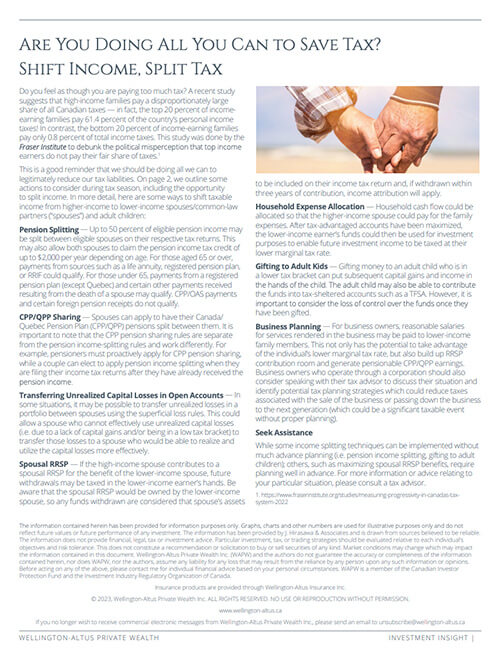Do you feel as though you are paying too much tax? A recent study suggests that high-income families pay a disproportionately large share of all Canadian taxes — in fact, the top 20 percent of income-earning families pay 61.4 percent of the country’s personal income taxes! In contrast, the bottom 20 percent of income-earning families pay only 0.8 percent of total income taxes. This study was done by the Fraser Institute to debunk the political misperception that top income earners do not pay their fair share of taxes.¹
This is a good reminder that we should be doing all we can to legitimately reduce our tax liabilities. On page 2, we outline some actions to consider during tax season, including the opportunity to split income. In more detail, here are some ways to shift taxable income from higher-income to lower-income spouses/common-law partners (“spouses”) and adult children:
Pension Splitting — Up to 50 percent of eligible pension income may be split between eligible spouses on their respective tax returns. This may also allow both spouses to claim the pension income tax credit of up to $2,000 per year depending on age. For those aged 65 or over, payments from sources such as a life annuity, registered pension plan, or RRIF could qualify. For those under 65, payments from a registered pension plan (except Quebec) and certain other payments received resulting from the death of a spouse may qualify. CPP/OAS payments and certain foreign pension receipts do not qualify.
CPP/QPP Sharing — Spouses can apply to have their Canada/ Quebec Pension Plan (CPP/QPP) pensions split between them. It is important to note that the CPP pension sharing rules are separate from the pension income-splitting rules and work differently. For example, pensioners must proactively apply for CPP pension sharing, while a couple can elect to apply pension income splitting when they are filing their income tax returns after they have already received the pension income.
Transferring Unrealized Capital Losses in Open Accounts — In some situations, it may be possible to transfer unrealized losses in a portfolio between spouses using the superficial loss rules. This could allow a spouse who cannot effectively use unrealized capital losses (i.e. due to a lack of capital gains and/or being in a low tax bracket) to transfer those losses to a spouse who would be able to realize and utilize the capital losses more effectively.
Spousal RRSP — If the high-income spouse contributes to a spousal RRSP for the benefit of the lower-income spouse, future withdrawals may be taxed in the lower-income earner’s hands. Be aware that the spousal RRSP would be owned by the lower-income spouse, so any funds withdrawn are considered that spouse’s assets to be included on their income tax return and, if withdrawn within three years of contribution, income attribution will apply.
Household Expense Allocation — Household cash flow could be allocated so that the higher-income spouse could pay for the family expenses. After tax-advantaged accounts have been maximized, the lower-income earner’s funds could then be used for investment purposes to enable future investment income to be taxed at their lower marginal tax rate.
Gifting to Adult Kids — Gifting money to an adult child who is in a lower tax bracket can put subsequent capital gains and income in the hands of the child. The adult child may also be able to contribute the funds into tax-sheltered accounts such as a TFSA. However, it is important to consider the loss of control over the funds once they have been gifted.
Business Planning — For business owners, reasonable salaries for services rendered in the business may be paid to lower-income family members. This not only has the potential to take advantage of the individual’s lower marginal tax rate, but also build up RRSP contribution room and generate pensionable CPP/QPP earnings. Business owners who operate through a corporation should also consider speaking with their tax advisor to discuss their situation and identify potential tax planning strategies which could reduce taxes associated with the sale of the business or passing down the business to the next generation (which could be a significant taxable event without proper planning).
Seek Assistance — While some income splitting techniques can be implemented without much advance planning (i.e. pension income splitting, gifting to adult children); others, such as maximizing spousal RRSP benefits, require planning well in advance. For more information or advice relating to your particular situation, please consult a tax advisor.
If you have any questions about how this relates to you or your investment portfolio and financial plan, please give us a call at 778 655 2410 or email us at thewonggroup@wellington-altus.ca
Sincerely,
Maili Wong, CFA, CFP, FEA
Senior Portfolio Manager & Senior Wealth Advisor
Wellington-Altus Private Wealth Inc.
Board Director
Wellington-Altus Financial Inc.






